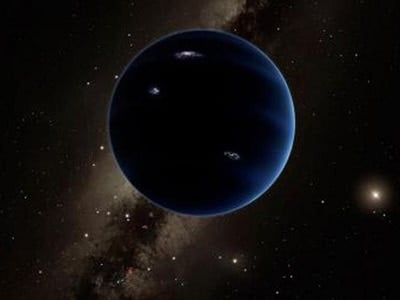
 Is there a ninth planet (not you, Pluto) hiding out there in the far reaches of the solar system?
Is there a ninth planet (not you, Pluto) hiding out there in the far reaches of the solar system?
If the new evidence is to be believed, there is, and it’s about ten times as massive as the Earth, large enough to have a significant impact on the orbits of all the other planets and possibly help to explain some enduring mysteries about our solar system.
Last week, NASA’s Jet Propulsion Lab in Pasadena, California, released a statement saying that Planet Nine “could be our missing super Earth.” First proposed by astronomers in 2014, the momentum behind the theory began to pick up in earnest last year with the release of a study by two astronomers with the California Institute of Technology, Konstantin Batygin and Mike Brown, who looked at the orbits of six known bodies floating out in the Kuiper Belt, that ring of frozen balls of methane and water circling out past Neptune at a distance of between 30 and 50 astronomical units (one AU represents the distance between the Earth and the Sun, roughly 150 million kilometres).
While astronomers have figured out a lot about Kuiper Belt objects — there are said to be over 100,000 significantly-sized Kuiper objects — much is still to be discovered. What Batygin and Brown showed was that the elliptical orbits of the six bodies were all tilted in comparison to “normal” orbital plane occupied by the eight (known) planets, including Earth.
What could be causing the strange tilt? The gravitational pull of a massive body out there in the darkness. And dark it is, meaning that the task of locating Planet X, as it’s sometimes referred to, is a difficult one, even with the help of our best telescopes peering into outer space.
“There are now five different lines of observational evidence pointing to the existence of Planet Nine,” said Batygin in the NASA statement. “If you were to remove this explanation and imagine Planet Nine does not exist, then you generate more problems than you solve. All of a sudden, you have five different puzzles, and you must come up with five different theories to explain them.”
Another study conducted by researchers at the University of Michigan’s Department of Astronomy used computer simulations to look at the stability of so-called Trans-Neptunian Objects (TNOs) and found that a Planet Nine, if it exists, would have served the purpose, over billions of years, of keeping TNOs from being ejected from the solar system, essentially arguing that our solar system is the way it is because of the work done by the so-far unobserved Planet Nine.
But wait a minute — we haven’t heard from the Canadians yet.
In a study released this past summer, researchers working with the Canada-France-Hawaii Telescope on Mauna Kea mountain in Hawaii completed what was hailed as the most comprehensive search so far for TNOs, looking at the distribution and features of such objects and concluding, perhaps sadly to some, that a Planet Nine might not be out there altering the orbits of nearby TNOs, after all. In fact, the Canadian-led study suggested that the best explanation for the orbital paths on record is as a random distribution, not one guided by Planet Nine.
“We don’t need an extra planet to explain the observations in our survey,” said Cory Shankman, a PhD student at the University of Victoria and lead author on the study.
Thus, perhaps someday one lucky observer will actually stumble on a Number Nine lurking out there in the shadows, but until then, the yea- and nay-sayers will continue to do battle.
Leave a Reply
You must be logged in to post a comment.


 Share
Share Tweet
Tweet Share
Share




Comment